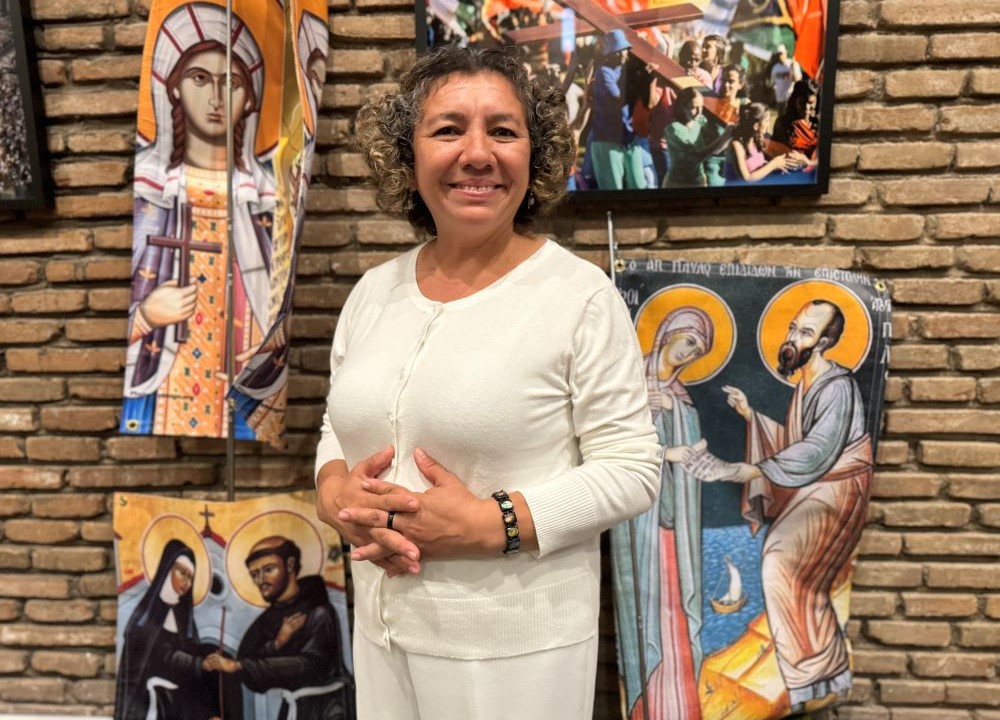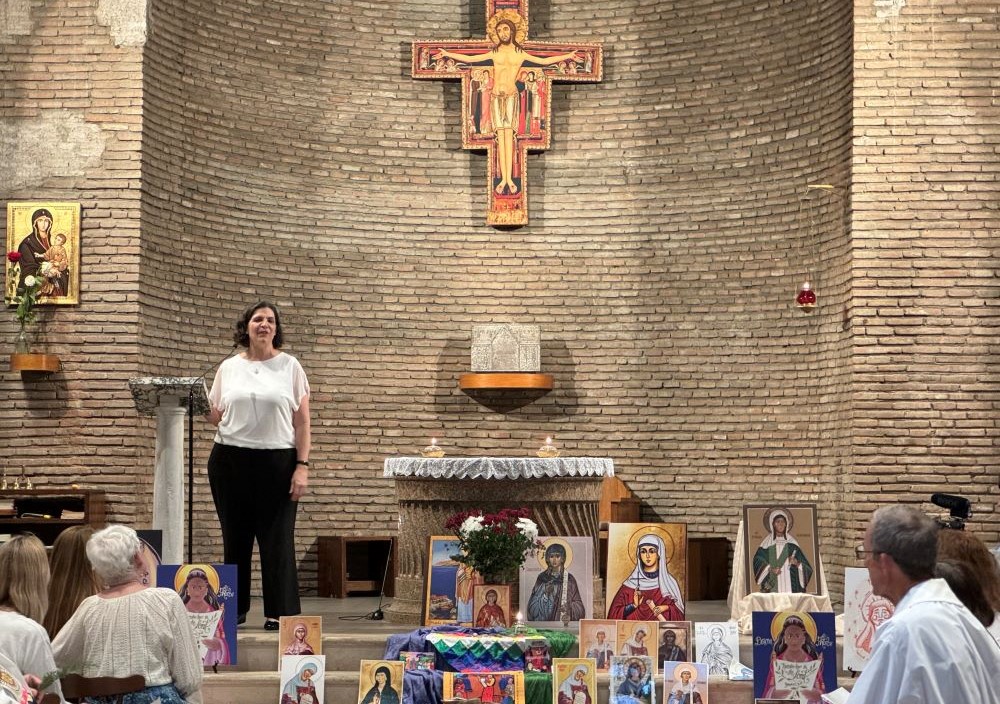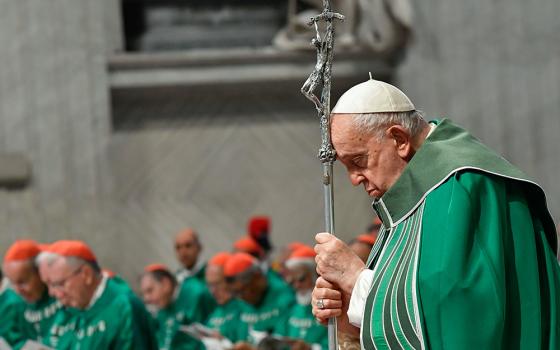
Rosa Bonilla stands near a banner representing St. Phoebe with St. Paul the Apostle at San Lorenzo chapel at the Centro Internazionale Giovanile in Rome Oct. 3. Bonilla, a parish pastoral assistant in Los Angeles, would love to serve as a deacon. (NCR photo/Rhina Guidos)
A day after the Vatican's doctrinal leader said the church must continue studying whether it can allow women to serve as deacons, a group carried on with its public prayer calling for expanded ministry roles for women in the church.
"We have the hope that the [women's diaconate) will be reestablished," Rosa Bonilla, a parish pastoral assistant, told the National Catholic Reporter Oct. 3. "And someone has to continue the work for future generations. If I don't get to see it — a change in this church — my daughters, granddaughters, nieces, they will get to see it. And we have that hope that it will happen."
Bonilla has ministered at Dolores Mission Church in Boyle Heights-East Los Angeles since 2012. She accompanies the poor, comforts those mourning a death in the family, takes the Eucharist to sick, offers reflections during the Liturgy of the Word and visits the sick. But the Catholic Church does not allow women deacons.
She shared her hopes during a prayer service Discerning Deacon organized at the San Lorenzo chapel of the Centro Internazionale Giovanile near the Vatican. Women and men prayed that the church would one day answer their call for what they see as a "restoration" of the female diaconate.
Cardinal Víctor Manuel Fernández, prefect of the Dicastery for the Doctrine of the Faith, had told members of the Synod of Bishops on Oct. 2 that that would not happen now.
"We know the public position of the pope, who does not consider the question [of women deacons] mature," Fernández told members of the Synod of Bishops on the first day the assembly met.
'Someone has to continue the work for future generations. If I don't get to see it — a change in this church — my daughters, granddaughters, nieces, they will get to see it.'
—Rosa Bonilla
At the prayer service the next day, word of Fernandez's comments spread. Ellie Hidalgo, co-director of Discerning Deacons, told the group she sees promise in the growth of the organization since it first gathered in 2021, as the synod was gathering momentum. And even as they experience setbacks, they have found one another and keep sharing in a common mission, sharing stories and asking questions that arise out of their encounters, she said.
"Now we're scores more and we've been in relationship with synod members, delegates, clergy, with deacons and with bishops," Hidalgo said. "We trust in the power of the Holy Spirit."
A few synod delegates attended the afternoon prayer, which took place as their daylong session was on its lunch break. They were sent off with a blessing, even though the diaconate for women is not on the synod agenda.
But many advocates for women deacons seemed undeterred.
Dermis de Jesús, a young lay leader at St. Vincent de Paul Church in Germantown, near Philadelphia, works in Spanish-language ministry. She said her family's devotion to the church led her to serving wherever she could in her parish. She described her mother, whose calling to serve God, by serving the people of God, was undeniable. And now it is part of her spiritual inheritance, one she wishes were not limited because she is female.
"We need to open the doors so that those of us [women] called by God can be ready, receive formation and be ready to respond to our God, without exception because of gender," she said.

Ellie Hidalgo speaks to members of Discerning Deacons during an Oct. 3 prayer service at the San Lorenzo chapel of Centro Internazionale Giovanile in Rome. Displayed are representations of St. Phoebe, thought to be an early deacon in the church mentioned by St. Paul the Apostle. (NCR photo/ Rhina Guidos)
JoAnn Lopez, a Toronto-based lay minister, said that in 2015, she received "a message from the Spirit," as others were praying for a friend.
"We don't often receive messages from the Spirit, but I knew in my bones, in a way I had never known before, I heard the Spirit say very clearly to me, 'You will see women do this in your lifetime,'" she said. "I thought, 'That's a strange thought. That's a strange thing to say.' "
But a friend then told her: "What if it's not you who will see women do this in your lifetime? But you will see it through, you have to be part of its unfolding. You have to be part of making it happen."
That's what Bonilla and others plan to do: keep going, not for themselves, but those who one day may benefit spiritually from their work. Bonilla, who survived war in El Salvador and an immigration journey to the United States, said the biggest obstacle is the limitations women feel, just because they want to carry out what God put in their hearts.
"We're not talking about, not working toward something that never was," she said. "We're simply reclaiming something that was part of the primitive church," she said.
But the Vatican says the topic needs more exploration and clarification of ministries that do and don't require holy orders, among other things.
"It's not about a title," Bonilla said. "For me, it would mean more freedom to exercise my ministry, with enthusiasm and joy. We need freedom to be and to open ourselves much more to the gifts and grace the Holy Spirit has poured out in all of us."
Advertisement








